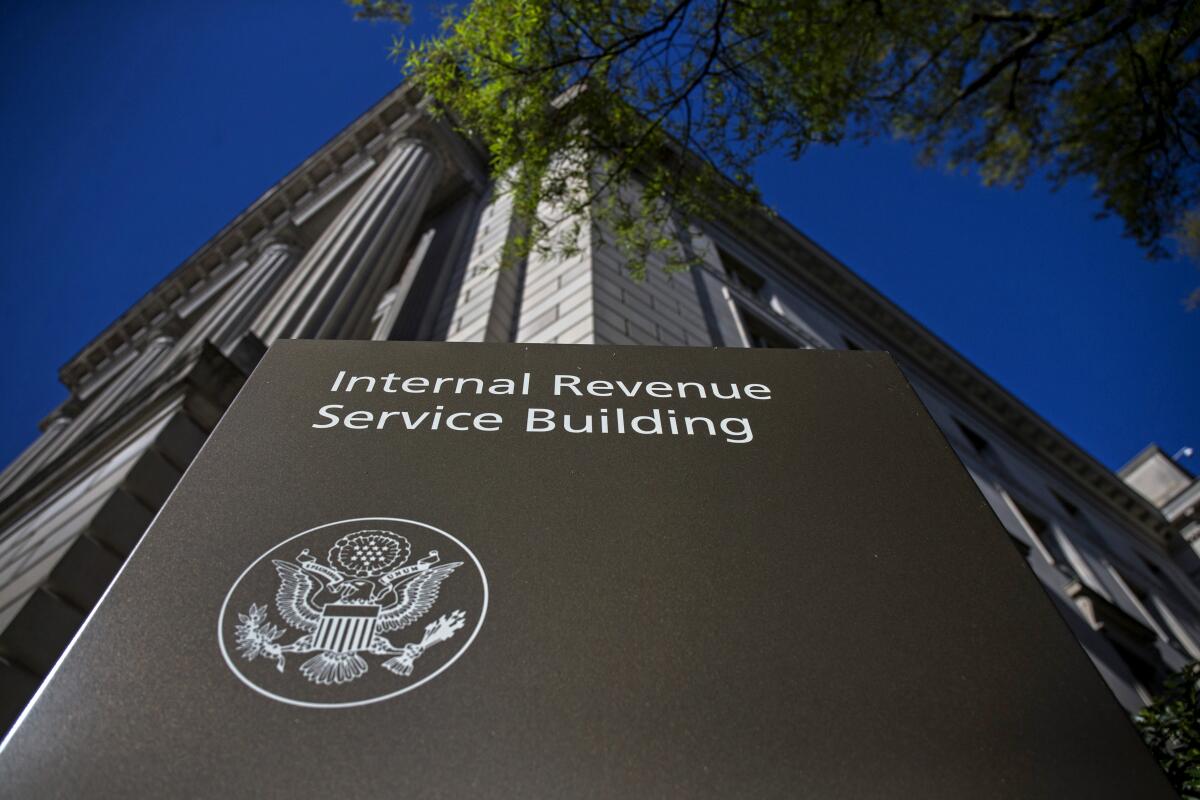IRS tells Californians to wait to file tax returns. That could cost you

- Share via
When it comes to unpleasant but necessary tasks, filling out your income tax return ranks right up there with cleaning out your rain gutters and having your blood drawn.
So you might think that no one would mind when the Internal Revenue Service told taxpayers in California and several other states to hold off filing their 2022 returns for an undetermined amount of time. The reason for the delay? The agency is still trying to figure out whether to collect taxes on California’s “Middle Class Tax Refund” and similar payments around the country.
But most taxpayers should mind. According to IRS statistics, more than three-quarters of the taxpayers who filed returns in 2021 were owed refunds. Although that share was a little smaller in previous years, it’s typically the case that well more than half of taxpayers overpay throughout the year, usually by having too much withheld from their paychecks.
“Anytime someone else has got your money and doesn’t give it to you right away, it’s a bad thing,” said Mike Cussen, a retired certified public accountant who volunteers as a tax aide for the AARP in in Paso Robles.
“We have tons of people, particularly single mothers and families, who file early because they get the Earned Income Credit and Child Tax Credits, which can be substantial,” Cussen said. “Now with this [Middle Class Tax Refund] hiccup, their returns will be on hold.”
According to the California Franchise Tax Board, the state issued more than $9 billion via check or prepaid debit card to more than 16.5 million households, the bulk of it going out last year. If you earned $250,000 or less as a single individual or $500,000 as a couple filing jointly, you were eligible for $200 to $1,050.
The new California ‘tax refund’ isn’t really a tax refund. But what is it? The uncertainty is why the taxability question is hard to answer.
The tax board has said all along that the payments would not be subject to California income taxes. But because the payments were not actually tax refunds, it wasn’t clear whether the feds would want to tax them.
Last week the IRS said that it was “working with state tax officials as quickly as possible to provide additional information and clarity for taxpayers.” It added: “For taxpayers and tax preparers with questions, the best course of action is to wait for additional clarification on state payments rather than calling the IRS. We also do not recommend amending a previously filed 2022 return.”
As of Thursday morning, the agency had no additional guidance.
If you didn’t receive a state payment last year and you are owed a tax refund, there’s no reason not to file your return. In fact, there are several reasons to file early regardless of whether you have a refund coming.
Mark Steber, chief tax information officer at Jackson Hewitt, says in an online video that “filing early stops someone else from using your or your family’s personal information to file a fake tax return and possibly steal your tax refund.” That sentiment is shared by many tax advisers.
Also, tax pros say that filing early can help you avoid the backlog caused by the flood of returns filed near the deadline, which would delay your refund. And doing your tax preparation early gives you more time to fix problems that may crop up, such as missing documents.
L.A. County property owners who suffer more than $10,000 in losses may qualify for a property tax reassessment. They may also get a break on penalties for missing the April deadline for paying their property tax bill.
Remember, if you underpaid over the course of 2022 and owe the IRS now, you don’t have to pay when you file your return. You can wait until returns are due, which for most Californians is May 15 this year. The IRS provided an extension to taxpayers in areas covered by January’s federal emergency declaration.
Cussen said that this may be a “no harm, no foul” situation if the IRS resolves the issue within the week, at least where lower-income filers are concerned.
Historically, people trying to commit tax fraud by claiming improper earned-income tax credits file very early in the year, before the IRS has the data it needs from employers to verify their claims, Cussen said. In response, the IRS holds onto returns that claim these tax credits until after Feb. 15, when the employers’ W-2 forms have been filed and the claims can be checked, he said.
The IRS wasn’t accepting any returns until Jan. 23, so early filers who didn’t seek earned-income tax credits are just starting to receive their refunds. Cussen said his first client’s filing went in on Feb. 1, and she received her refund on Feb. 8.
Tax pros also recommend filing your return electronically and having your refund sent electronically to your bank account to reduce the chances of fraud and errors. “Efile and direct deposit is the only way to go,” Cussen said.
About The Times Utility Journalism Team
This article is from The Times’ Utility Journalism Team. Our mission is to be essential to the lives of Southern Californians by publishing information that solves problems, answers questions and helps with decision making. We serve audiences in and around Los Angeles — including current Times subscribers and diverse communities that haven’t historically had their needs met by our coverage.
How can we be useful to you and your community? Email utility (at) latimes.com or one of our journalists: Jon Healey, Ada Tseng, Jessica Roy and Karen Garcia.
More to Read
Sign up for Essential California
The most important California stories and recommendations in your inbox every morning.
You may occasionally receive promotional content from the Los Angeles Times.













